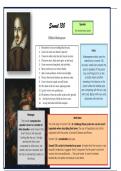Sonnet 130 Speaker:
An anonymous lover
William Shakespeare
1. My mistress' eyes are nothing like the sun;
2. Coral is far more red, than her lips red: Irony:
3. If snow be white, why then her breasts are dun; Shakespeare mainly uses the
4. If hairs be wires, black wires grow on her head. verbal irony in sonnet 130.
5. I have seen roses damasked, red and white, Actually, verbal irony means the
6. But no such roses see I in her cheeks; poet or speaker of the poem
7. And in some perfumes is there more delight says one thing but he or she
8. Than in the breath that from my mistress reeks. actually means another
9. I love to hear her speak, yet well I know meaning. For instance, in the
10. That music hath a far more pleasing sound: poem where his mistress eyes
11. I grant I never saw a goddess go, are comparing with the sun, Lips
12. My mistress, when she walks, treads on the ground: with coral, Breast with snow and
13. And yet by heaven, I think my love as rare, blackness with wire hair.
14. As any she belied with false compare.
Massage:
Main idea:
This sonnet compares the
speaker's lover to a number of The main idea in Sonnet 130 is to challenge those poets who use too much
other beauties—and never in the hyperbole when describing their loves. The use of hyperbole and cliché
lover's favour. Her eyes are originated with the poetry of ancient Greece and Rome.
“nothing like the sun,” her lips Sonnet 130 is remarkable because,
are less red than coral;
compared to white snow, her Sonnet 130 is a kind of inverted love poem. It implies that the woman is very
breasts are dun-coloured, and beautiful indeed but suggests that it is important for this poet to view the
her hair is are like black wires on woman he loves realistically. ... The poet wants to view his mistress
@Juffrou_Ansie her head. realistically and praise her beauty in real terms.
, What aspect of literature does Sonnet 130
mock?
the Elizabethan conventions of poetry that 1. My mistress' eyes are nothing like the sun;
extolled ideal love as well as satirizing the
2. Coral is far more red, than her lips red:
Petrarchan sonnets that compared the object
of love to Nature in hyperbolic terms 3. If snow be white, why then her breasts are dun;
4. If hairs be wires, black wires grow on her head.
5. I have seen roses damasked, red and white,
6. But no such roses see I in her cheeks;
7. And in some perfumes is there more delight
Meaning
8. Than in the breath that from my mistress reeks.
The meaning of this poem is interesting to understand.
9. I love to hear her speak, yet well I know
Though Shakespeare presents the main idea in the
couplet, each section reveals the qualities of a lady the 10. That music hath a far more pleasing sound:
speaker loves. According to the poetic persona, his 11. I grant I never saw a goddess go,
beloved is unlike the beautiful things of nature. She is as
12. My mistress, when she walks, treads on the ground:
she is, not a lady with heavenly attributes. The speaker
loves a lady with whom he can share his heart. There is 13. And yet by heaven, I think my love as rare,
no need to have a goddess if one has a partner who 14. As any she belied with false compare.
understands the minute emotional impulses. That’s why
the speaker proclaims his love is rare as he does not
flatter her with false epithets.
Sonnet 130 is different from other poems:
Structure and Form
It is a love poem about an unknown woman
Usually, most Elizabethan love poetry was written in the whom Shakespeare describes as his mistress. ...
tradition of the Petrarchan sonnet. Contemporary poets, “Sonnet 130” is different from most love poems
such as Philip Sidney and Watson, would use the in the fact that it can be interpreted in two
Petrarchan sonnet for its poetic form, whereas in ‘Sonnet different ways. This poem can be seen as a
130,’ Shakespeare mocks all the conventions of it. This satirical and funny sonnet, or it can be viewed
sonnet consists of three quatrains, followed by a rhyming as a serious poem that expresses true love.
couplet. The rhyme scheme of this piece is ABAB CDCD
EFEF GG. Shakespeare composed the poem in iambic
pentameter with a few variations. It means the meter is
@Juffrou_Ansie based on five beats or iambs per line.




